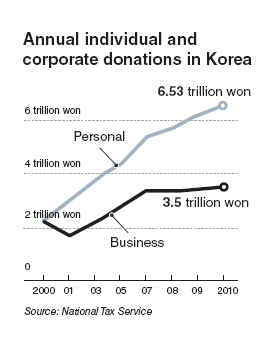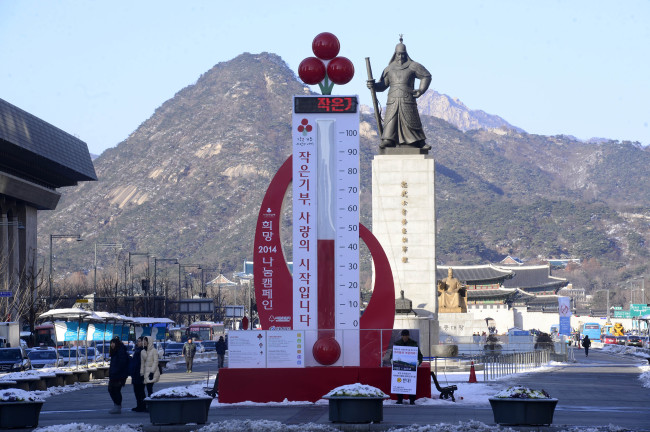Warm hearts still in short supply
Donations increasing quickly in Korea, but calls growing for greater tax benefits and social recognition of rich givers
By Korea HeraldPublished : Dec. 20, 2013 - 20:40

The season of giving is back. From the sound of Salvation Army bells ringing on snowy streets to photos of young volunteers busy delivering coal briquettes to low-income neighborhoods, the spirit of sharing is alive across the country.
In December and January, Koreans donate around 70 percent of the yearly total of charitable funds, goods and services given back to society.
The country has seen dramatic growth in the amount of donations in recent years.
Individuals and businesses donated a combined total of 11.2 trillion won ($10.6 billion) in 2011, a three-fold increase from the 4.7 trillion won given in 2001, according to data released by the National Tax Service. Individual donations accounted for 63.5 percent of the total, or 7.09 trillion won, in 2011. Koreans who claimed tax deductions on donations gave 1.37 million won on average as of 2010, the NTS said.

A variety of channels and tools for giving have been developed by a growing number of charity organizations and community leaders. Philanthropists have the option of giving money, goods or in-kind resources such as their time, skills or knowledge.
Kim Joon-ho, a computer engineering professor at Dong Seoul College, is one of many philanthropists developing tools to promote giving, particularly through small contributions.
In May, Kim founded “Mirinae,” an online-based network of restaurants, cafes and flower shops that accept payments from their customers for future patrons who cannot afford to pay. “Mirinae” means paying in advance in Korean.
At a Mirinae member restaurant, anyone can have a free meal that has already been paid for by anonymous customers. The system was inspired by the “suspended coffee” movement, which started in Naples, Italy, about 100 years ago.
So far, over 120 local businesses have joined the network. Kim says that the amount of interest has exceeded his expectations. “I wished to have about 10 businesses involved. I’ve learned that there are many warmhearted people in Korea,” he said. “I hope this project will give momentum to community-based social services and (help people) ... realize that even small changes can have an effect on our society.”
Low level of charity
Despite its prosperous economy and active civic movements, Korea still has a long way to go when it comes to making donations common and routine, experts say. The country’s tradition of bequeathing wealth to children, a lack of engagement by the rich and a deep public distrust of charity organizations have hindered efforts to foster a charitable environment, they added.
Figures show that, compared to many other countries, the country’s culture of giving is still in its infancy.
Korea, the world’s 10th-largest economy, placed 45th among 146 countries listed in the World Giving Index 2012, released by the U.K.-based Charity Aid Foundation.
In a separate study, individual giving in Korea accounted for only 0.14 percent of gross domestic product (1.7 trillion won). The GDP share of individually donated money contrasts sharply with the United States and other advanced countries. The United States was the most generous country in the world, with $291 billion in donations ― about 2 percent of its GDP.
“The size of individual donations in Korea remains relatively small compared to other advanced countries because many wealthy people are not bothering with donations. They are hesitating,” said Jun Hyun-kyung, manager of the Center on Philanthropy at the Beautiful Foundation.
In a survey conducted by Statistics Korea, 54.8 percent of respondents said the best way to improve our culture of giving would be for leaders and rich people to step up their efforts to practice noblesse oblige. About 20 percent of respondents called for reinforcing transparency in the distribution of charitable funds.
The low amount of tax deductions for donations is a big problem, Jun pointed out.
“The country does not have enough tempting benefits to make the rich open their purses,” she said, adding that earlier this year the Finance Ministry further downsized existing tax benefits to increase tax revenue.
For instance, an office worker with an annual salary of 80 million won who donated 2 million won a year would receive only 300,000 won in tax deductions starting from next year, down from 480,000 won this year.
Experts say the new tax measures will increase government revenue by 73 billion won a year. But they will also have a negative impact on individual donations, causing an estimated 1 trillion won of losses in charitable funding, experts say.
Along with insufficient tax benefits, another factor that discourages the rich from giving is the lack of social acknowledgement.
“The number of rich Koreans has been growing. But no one is applauding them and speaking highly of their decision to share their wealth. The rich are not trained to make changes,” Jun said.
The number of individuals holding more than 1 billion won in financial assets surged 80 percent to 156,000 in 2012, up from 88,000 in 2006. The total amount of financial assets held by Koreans surged to 461 trillion won from 287 trillion won in the same period, according to a recent report released by Hana Financial Corp.
History of giving

The nation’s first private nonprofit foundation was established in 1939 by the founder of Samyangsa, now a local noodle maker. The organization aimed to support aspiring students by offering education opportunities and better life environments. The number of nonprofit foundations increased even after Korea was liberated from Japanese colonial rule in 1945. Soon, though, the government began putting limits on charity organizations and restricting the giving of private donations to influential figures in the community.
“In 1949, the Korean government established a law to control donations, as part of its efforts to protect citizens from having their assets and money swindled from them by corrupt officials of local governments and small villages. The law and the tradition of limiting the role of private donations was in effect until 1997,” Jun said.
But with the emergence of civil society in 1999 and the early 2000s, the government started to loosen its control over the charity sector. The number of charity organizations in Korea surged around this time.
Three years ago, the Health Ministry, under the Lee Myung-bak government at the time, actively promoted a sharing campaign in the private sector, partly inspired by “The Giving Pledge” initiated by Bill Gates and Warren Buffett. The two U.S. entrepreneurs have urged other American and international business leaders to donate half their personal assets within their lifetime. As of July 2013, 115 billionaires have signed up, including some of the wealthiest entrepreneurs in the world, with pledges so far topping $500 billion.
“The Korean government started to promote philanthropic funding at that time because it realized that the giving sector could serve as an alternative (in helping) to meet a growing demand for public welfare,” Jun said.
The government will play a role as a mediator or an invisible hand to encourage leaders to return their fortunes to society as a force for good, an official commented.
“I believe that the power moving the U.S. society forward is its deeply rooted culture of giving. Korea has a lot to learn,” said Koh Chi-bum, director of the Division of “Nanum” (Sharing) Policy. The ministry is planning a nationwide campaign to promote charitable bequests next year.
By Cho Chung-un (christory@heraldcorp.com)
-
Articles by Korea Herald








![[LLG] Unseen inheritance: Trauma of transnational adoption 'trickles down' to adoptees' children](http://res.heraldm.com/phpwas/restmb_idxmake.php?idx=644&simg=/content/image/2024/05/12/20240512050141_0.jpg&u=20240512163544)


![[KH Explains] Hyundai Motor’s plan for new landmark keeps hitting bumps](http://res.heraldm.com/phpwas/restmb_idxmake.php?idx=644&simg=/content/image/2024/05/13/20240513050626_0.jpg&u=20240513162558)







![[Today’s K-pop] Seventeen hits Billboard 200 at No. 5 with best-of album](http://res.heraldm.com/phpwas/restmb_idxmake.php?idx=642&simg=/content/image/2024/05/13/20240513050721_0.jpg&u=)